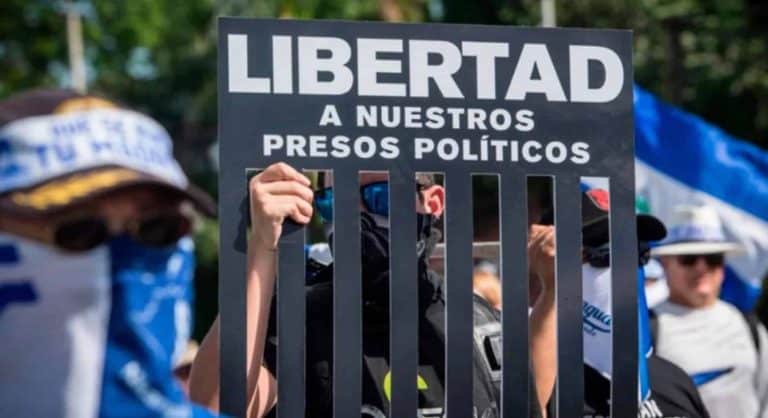7 de julio 2024

Children of Exile: The Births “Sowing Hope” in the Camp of Nicaraguan Farmers

PUBLICIDAD 1M
PUBLICIDAD 4D
PUBLICIDAD 5D
Online trials are indeed contemplated by Nicaraguan law, but regime authorities do not respect procedural guarantees

Protest for the freedom of political prisoners in Nicaragua. File Photo / Confidencial
Eleven Nicaraguan political prisoners were tried and sentenced between March and June 2024 through videoconference trials, a legal figure that — according to independent lawyers — the Ortega regime uses to further isolate political prisoners in Nicaragua, which currently total 141 women and men.
These “virtual” trials emerged in mid-2023, although there is still no exact figure on how many political prisoners have faced them. The Ortega justice system conceals them, and the prisoners’ families do not report them to avoid reprisals against them or their imprisoned relatives.
Regarding these trials, Nada Al-Nashif, the Deputy High Commissioner of the UN Office of the High Commissioner for Human Rights (OHCHR), stated on June 20 that they “do not meet the basic guarantees of due process and fair trial.”
Lawyers consulted by CONFIDENCIAL agree that videoconference hearings are “normal” in different parts of the world and are contemplated in Article 136 of Nicaragua’s Criminal Procedure Code, which establishes that the judge may use “electronic means.”
However, they warn that these “virtual” trials are “null” when “the rights and guarantees of due process” are not safeguarded, which is the case in Nicaragua.
Videoconference trials for political prisoners are conducted to “prevent inmates from leaving (the prison), having contact with their defense attorney, or making any requests to the judge,” warns criminal lawyer Yonarqui Martinez.
“It is a coercive measure because through a screen, the inmate cannot express what they feel. The judge cannot see the inmate in all their facets, and the time is limited,” continues Martínez, who has defended dozens of Nicaraguan political prisoners.
She explains that for a videoconference hearing to take place, the parties must be notified in advance, the defense attorney must agree, and the reasons for holding the hearing this way must be “clearly” known. However, in Nicaragua, “none of that happens,” she affirms.
“In Nicaragua, due process guarantees are not met to ensure that the inmate’s rights are not violated: the right to defense, the right to express themselves, the right to health, the right to many more things,” details Martínez.
Lawyer Salvador Marenco, from the Nicaragua Never Again human rights group, explains that this practice puts political prisoners in a situation of “greater vulnerability” since it prevents them from having contact with their families and stops them from continuing to denounce the torture and cruel treatments happening inside the Penitentiary System.
“Not being taken to the Courts is not an isolated action; it is part of a context of violations of due process guarantees where there is no access to information, a trusted defense attorney cannot be named, and there is no access to the case file,” emphasizes Marenco.
The holding of videoconference trials also emotionally affects political prisoners and subjects them “completely” to the will of regime officials, stresses the human rights defender.
“The practice of these (virtual) trials increases the vulnerability of people, especially those who are being subjected to conditions of isolation. There is total subjugation because, for example, if a political prisoner wants to say they are being mistreated, the official can simply turn off the microphone, the camera, and that’s it,” describes Marenco.
Among the most well-known “virtual” trials is that of political prisoner and vice-president of the April 19th University Movement, Jasson Salazar. This took place on August 8, 2023, via Zoom, a videoconferencing and virtual meeting platform. That day, behind a screen, Judge Ulisa Tapia, head of the Thirteenth Criminal Court of the Nicaraguan capital, found him guilty of the alleged crimes of “undermining national integrity and spreading false news.”
Like Salazar, academic Freddy Quezada was tried and convicted in a videoconference hearing, according to a [court appointed] public defender who informed his family in January 2024. However, the university professor has not been seen since he was arrested seven months ago, which technically makes him a case of “forced disappearance.”
In both cases, the political prisoners were not even taken to a court for processing and were instead found guilty through videoconferences. Their trials illustrate one of the new arbitrary practices of the Ortega regime’s justice.
This article was published in Spanish in Confidencial and translated by Havana Times. To get the most relevant news from our English coverage delivered straight to your inbox, subscribe to The Dispatch.
PUBLICIDAD 3M
Confidencial es un diario digital nicaragüense, de formato multimedia, fundado por Carlos F. Chamorro en junio de 1996. Inició como un semanario impreso y hoy es un medio de referencia regional con información, análisis, entrevistas, perfiles, reportajes e investigaciones sobre Nicaragua, informando desde el exilio por la persecución política de la dictadura de Daniel Ortega y Rosario Murillo.
PUBLICIDAD 3D